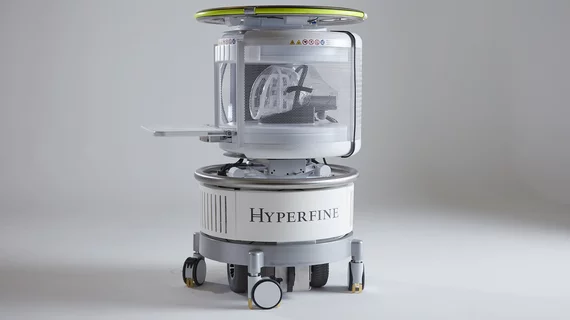FDA clearance news: Hyperfine’s portable MRI nod, RapidAI takes on LVOs, and more market moves
Hyperfine Research has received a new U.S. Food and Drug Administration clearance for its point-of-care MRI system, the company announced Thursday.
The portable MRI leader gained the FDA nod to scan patients 2 years old and under using its Swoop technology. Previously, Hyperfine had received clearance for its bedside modality in pediatric patients older than 2 years.
According to a spokesperson from the firm, Hyperfine is moving forward with this iteration of its technology, which is now available to purchase, with shipments beginning “immediately,” it announced Aug. 13.
“Six years ago, we had a crazy vision to create a new product category for imaging: an affordable point-of-care MRI system,” Founder and Chairman, Jonathan Rothberg, PhD, said in a statement. “With this clearance from the FDA, we are launching an astonishing new diagnostic tool for patients and providers in our Swoop Portable MRI, and we are delivering on our mission to democratize healthcare across clinical settings and geographies.”
Bayer’s MRI contrast option gets the nod
The FDA has given Bayer’s Gadavist (gadobutrol) MRI contrast agent the green light for a bulk packaging option.
According to an Aug. 14 announcement, the contrast agent will now be available in both 30 mL and 60 mL options which will enable weight-based dosing with a 24-hour stand time for multi-patient dosing.
Additionally, the FDA cleared Bayer’s Medrad Imaging Bulk Package Transfer Spike that is indicated for the transfer of Gadavist contrast media as supplied in the Imaging Bulk Package presentation, the firm said Friday.
Bulk packaging affords a more “complete” use of contrast and less waste compared to single-use bottles, said Head of Region Americas, Bayer Radiology, Dennis Durmis. This packing also abides by Joint Commission mandates for multi-patient dosing.
RapidAI gains another clearance
Advanced stroke imaging company RapidAI received another FDA clearance Thursday for its platform that spots suspected large vessel occlusions.
LVOs are the deadliest form of stroke, and Rapid’s software can help physicians identify such cases in three minutes, the firm said. It uses a vessel tracker to pick out suspected LVOs with 97% sensitivity and specificity of 96%.
“The ability to identify LVOs rapidly facilitates more effective treatment,” Cofounder of the Menlo Park, California, firm, Greg Albers, MD, said Aug. 13. “This is why we are very excited about the FDA clearance of Rapid LVO, a significant step forward in stroke diagnostics and care.”
United Imaging’s PET update
Medical imaging and radiotherapy equipment manufacturer United Imaging gained FDA clearance for its image processing function intended to reduce the noise of fluorodeoxyglucose (FDG) PET images.
The uAI Hyper Deep Learning Reconstruction (DLR) function utilizes a deep learning post-processing technique to bolster signal-to-noise-ratio and contrast-to-noise ratio while maintaining image quality, United Imaging announced Aug. 11.

